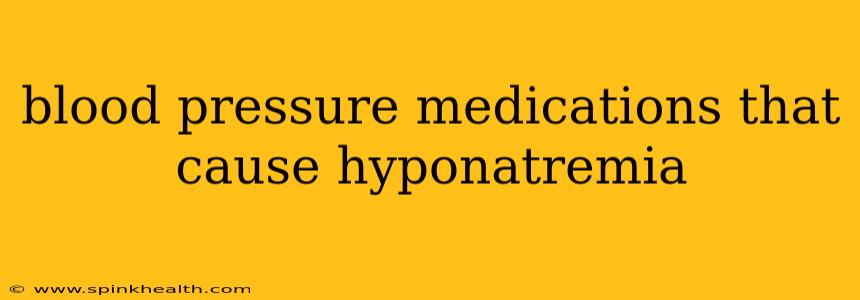Blood Pressure Medications That Can Cause Hyponatremia: A Deep Dive
Hyponatremia, a condition characterized by dangerously low sodium levels in the blood, can be a serious side effect of certain blood pressure medications. This isn't something to be taken lightly; understanding which medications carry this risk and how to manage it is crucial for both patients and healthcare providers. My journey into researching this topic began with a personal experience – a friend’s unexpected hospitalization due to hyponatremia linked to their blood pressure medication. This sparked my interest in understanding this complex interplay between medication and electrolyte balance. Let's delve into the details.
What is Hyponatremia?
Before we dive into the medications themselves, let's establish a clear understanding of hyponatremia. It's a condition where the sodium concentration in your blood is abnormally low. Sodium is essential for maintaining fluid balance, nerve and muscle function, and overall bodily processes. Severe hyponatremia can lead to symptoms ranging from mild nausea and confusion to seizures, coma, and even death. The severity depends on how low the sodium levels drop and how quickly the decrease occurs.
Which Blood Pressure Medications Can Cause Hyponatremia?
Several classes of blood pressure medications have been linked to hyponatremia, and the risk varies depending on the specific drug and the individual patient. Some of the most frequently implicated include:
-
Thiazide diuretics: While generally effective for lowering blood pressure, certain thiazide diuretics can increase the risk of hyponatremia, particularly in older adults and those with kidney problems. The body's ability to regulate sodium can be affected, leading to a potential deficit.
-
Loop diuretics: These potent diuretics, while effective in removing excess fluid, also increase the risk of hyponatremia. This is because they excrete significant amounts of sodium through urine.
-
ACE inhibitors: These medications block the renin-angiotensin-aldosterone system (RAAS), which plays a role in sodium regulation. Inhibition of this system can lead to an imbalance, increasing the likelihood of hyponatremia in susceptible individuals.
-
Angiotensin receptor blockers (ARBs): Similar to ACE inhibitors, ARBs also affect the RAAS, thereby increasing the possibility of hyponatremia, especially in individuals with certain underlying health conditions.
-
Certain antidepressants: While not primarily blood pressure medications, some antidepressants, particularly those with diuretic properties, may contribute to hyponatremia. This is often an under-recognized interaction.
What are the symptoms of Hyponatremia caused by blood pressure medication?
This is a crucial question, as early detection is key to preventing serious complications. Symptoms can vary, but commonly include:
-
Nausea and vomiting: These are often early warning signs.
-
Headache: A persistent or worsening headache might indicate a developing sodium imbalance.
-
Confusion and lethargy: Mental changes can be a significant indicator, especially in older adults.
-
Muscle weakness or cramps: These can be related to the disruption of nerve and muscle function.
-
Seizures: In severe cases, hyponatremia can lead to seizures, a medical emergency.
If you experience any of these symptoms while taking blood pressure medication, seek immediate medical attention.
How is Hyponatremia Diagnosed and Treated?
Diagnosis typically involves a simple blood test to measure sodium levels. Treatment depends on the severity of the hyponatremia and often involves adjusting medication, increasing sodium intake (under medical supervision), and in severe cases, intravenous fluids.
Who is at higher risk of developing hyponatremia from blood pressure medications?
Several factors increase the risk:
-
Older adults: As we age, the kidneys' ability to regulate sodium diminishes.
-
People with kidney disease: Impaired kidney function hinders the body's capacity to manage sodium levels.
-
Individuals with heart failure: Fluid imbalances are common in heart failure, increasing the risk of hyponatremia.
-
Those taking multiple medications: Polypharmacy, the use of many drugs simultaneously, increases the chance of drug interactions that can disrupt electrolyte balance.
Can I prevent hyponatremia while taking blood pressure medication?
While you can't entirely eliminate the risk, careful monitoring and communication with your doctor are crucial. Regular blood tests to monitor sodium levels can detect early signs of hyponatremia. Open communication with your doctor about any symptoms you experience is essential. It's important to highlight any pre-existing conditions, especially kidney issues or heart failure.
Disclaimer: This information is for educational purposes only and does not constitute medical advice. Always consult your doctor or other qualified healthcare professional before making any decisions related to your health or treatment. They can assess your individual risk factors and determine the best course of action.

